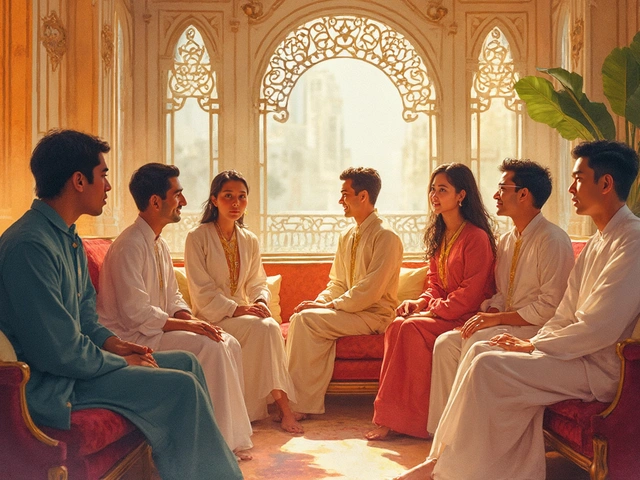
Moving to Dubai isn't just about hopping on a plane and chasing a paycheck. For a lot of Philippine girls, it’s a real shot at a better life, helping families back home, and grabbing hold of new experiences. Dubai packs a punch with its fancy buildings and endless lights, but the city means long work hours, strict rules, and way different weather than what you get in Manila or Cebu.
If you’re thinking about making the move, you need to know the basics—work visas, job contracts, and how employers handle things in Dubai. It’s easy to get caught off guard if you don’t check the small print on your job offer. Think about this: Filipinas work in every field in Dubai, from hospitality and nursing to office jobs and retail, but there’s a big difference between stories you hear online and what really goes down once you land in the city. Taking the time to ask the right questions and double-checking paperwork can save a lot of stress down the road.
You’ll quickly see—community means everything here. Most Philippine girls find friends fast, whether at a church service, a karaoke night, or a local Jollibee. There’s a kind of built-in support system. Everyone misses home sometimes, so don’t be shy about reaching out for help. It’s what helps keep you going, even when the desert heat gets brutal or homesickness sneaks up.
- Why Philippine Girls Move to Dubai
- Work Opportunities and Common Jobs
- Adjusting to the Dubai Lifestyle
- Community and Social Life
- Tips for Thriving in Dubai
Why Philippine Girls Move to Dubai
You can’t walk around Dubai without meeting someone from the Philippines. So, why do so many Philippine girls head here? Honestly, most of it comes down to jobs and better pay. In the Philippines, the minimum wage just can’t cover much—especially in cities like Manila. Meanwhile, even entry-level work in Dubai often pays two to three times more. That money doesn’t just cover rent, it also supports parents, younger siblings, and sometimes even whole extended families back home.
Another thing—Dubai has a massive demand for workers, especially in hospitality, retail, nursing, and domestic jobs. Agencies in the Philippines are always posting new openings. It’s worth knowing that, according to the Philippine Department of Migrant Workers, the UAE is the second-largest destination for Overseas Filipino Workers (OFWs). Women make up a big chunk of that, especially in service jobs. It’s not rare for a Filipina to land a hotel or executive assistant gig, thanks to their reputation for strong English skills and customer service.
Of course, it’s not all about money. Many Philippine girls move to Dubai for the thrill of adventure, the chance to see how things work outside the Philippines, and to meet people from all over the world. The city’s got this global vibe—people bring their traditions, food, and stories. Sometimes it’s about leaving behind a tough breakup or dodging family drama. Others come for personal growth, chasing independence and a bit of that "I made it on my own" feeling.
- Job demand, especially in service and healthcare
- Higher salaries compared to the Philippines
- New experiences and global friendships
- Opportunities to support their families back home
- A safer city vibe (Dubai has very low crime rates)
One thing is clear: the dream to build a better future still drives most Philippine girls in Dubai, and that dream shows up in every remittance, video call home, or family reunion.
Work Opportunities and Common Jobs
Philippine girls in Dubai are known for their strong work ethic and serious hustle. Most land jobs way before booking that ticket, usually through agencies or word of mouth. The usual workplaces? Think hotels, restaurants, hospitals, clinics, malls, and cleaning companies.
Here’s a quick look at the most common jobs Filipinas grab in Dubai:
- Hospitality: Lots work as hotel receptionists, room attendants, or waitresses. Big hotel chains in Dubai are always on the hunt for staff because tourism is nonstop year-round.
- Retail: From luxury stores in Dubai Mall to gadget shops, Filipinas are trusted for their friendly attitude in sales roles.
- Nursing and Caregiving: Dubai needs nurses, and many clinics and hospitals hire Filipinas since they’re well-trained and usually speak English well.
- Domestic Work: Housekeeping and nanny jobs are still super common, but be careful—always make sure your contract matches what you agreed to back home.
- Office Staff: Secretarial, admin, and accounting jobs are popular, especially if you’ve got solid experience or good computer skills.
Here’s a table with a snapshot of the most common sectors and what they pay (as of 2025):
| Job Sector | Typical Monthly Salary (AED) | Notes |
|---|---|---|
| Hospitality | 1,500 - 3,000 | Varies with experience and hotel rating |
| Retail | 2,000 - 4,000 | Can earn commission on top of salary |
| Nursing / Healthcare | 4,000 - 7,000 | Licensed nurses earn more |
| Domestic Work | 1,200 - 2,500 | Live-in jobs usually include food and lodging |
| Office/Admin | 2,500 - 5,500 | Salary bumps up with years in Dubai |
The biggest tip? Don’t rush. Research every job, check your employment contract, and stay away from offers that sound too good to be true. Legal jobs should always come with a proper work visa and clear terms. If you ever get stuck, the Philippine Overseas Labor Office (POLO) in Dubai can help out. And never pay recruiters outside what’s legal—scams are common, so protect your hard-earned cash.

Adjusting to the Dubai Lifestyle
Landing in Dubai can feel like stepping onto another planet. The first thing Philippine girls notice is the heat—summers go above 40°C and even at midnight, it’s still warm. If you’re not used to this, always carry water and stick to indoor air-conditioned spaces during the hottest hours.
Work schedules usually run Sunday to Thursday, not Monday to Friday like back home. The weekend is Friday and Saturday, which can mess with your routine at first. Most jobs, especially in offices and malls, follow this. You’ll get used to it, but it throws everyone off the first month or two.
Another big change? Dubai follows strict rules. Drinking in public, showing too much skin, and PDA (public display of affection) can get you in trouble. It’s not just a warning—over 2,500 cases of fines for public decency were reported last year. So, keep outfits modest, especially in government buildings and malls. For swimming, stick to proper swimwear at the pool or beach, not shorts and a t-shirt.
The city is a real mix of cultures, but as a Philippine girls in Dubai community member, you’ll notice you’re everywhere—from small restaurants to huge hospitals. At the same time, you might feel homesick. Luckily, there are Filipino groceries, barbershops, and even festivals like Barrio Fiesta every year where over 10,000 Filipinos gather for food and music. These places make the city feel less lonely.
Be ready to budget. Life in Dubai looks glamorous, but rent and groceries are expensive. Single-bed apartments average around 3,500 AED (about ₱53,000) per month. Taking shared flats is popular and way cheaper. Here’s a quick cost breakdown:
| Expense | Monthly Cost (AED) |
|---|---|
| Shared Flat | 1,500–2,000 |
| Groceries | 600–1,000 |
| Transport Card | 300 |
| Mobile/Internet | 150 |
If you want to get around, the Metro is cheap and reliable. Women-only cars up front make solo trips feel safer—just look for the pink signs. There are also tons of taxis, but they cost more. Most Filipinas avoid driving unless their company provides a car (licenses can be tough and pricey to get).
- Learn basic Arabic greetings—"Shukran" (thank you) and "Salam Alaikum" (hello) go a long way.
- Download apps like Careem (for rides), Talabat (food delivery), and Noon (online shopping) – these make daily life way easier.
- Always save emergency numbers in your phone. Dubai Police (999) speaks English and responds fast if you ever need help.
Life here really gets better when you get the hang of these habits. Don’t be afraid to ask coworkers or new friends how they manage. Most people remember how tricky those first months were, so they’re usually happy to help you settle in.
Community and Social Life
Having a tight-knit group makes all the difference when you’re far from home. In Dubai, there are about 450,000 Filipinos as of 2024, and among them, Philippine girls in Dubai have built a community that feels like a second family. You can feel it in places like St. Mary’s Catholic Church, where you’ll always spot Pinoys chatting after mass, or in Filipino-owned salons in Karama where you can just be yourself and drop the small talk.
Jollibee and Chowking aren’t just places to eat—they’re little reminders of home and always packed with kabayans. There are also regular Filipino festivals at Dubai World Trade Centre, which is where you’ll find live OPM music, food stalls, and even parlor games you grew up playing. Social media, especially Facebook groups like "Pinay in UAE" or "Filipinos in Dubai," make it easy to ask for tips, share job leads, or just make friends. Most folks reply within hours, so you never really feel alone for long.
| Popular Filipino Community Spots | What You’ll Find |
|---|---|
| St. Mary’s Catholic Church | Mass in Tagalog, outreach programs, new friends |
| Karama | Filipino salons, restaurants, groceries |
| Dubai World Trade Centre | Philippine festivals, job fairs, concerts |
| Jollibee/Chowking (MOE, BurJuman, Deira City Centre) | Pancit, Chickenjoy, a taste of home |
Making friends or finding help is easier if you know where to look. Here are some quick tips for staying connected:
- Join at least one Filipino social group on Facebook or WhatsApp as soon as you arrive.
- Show up at community events or festivals—you’ll always find someone willing to introduce you around.
- Don’t wait to ask for help when you need it; most kabayans know what it’s like to be new here.
- Volunteer or take part in group activities, like basketball games or karaoke nights—they’re big in Filipino circles.
Dubai’s rules are strict but friendly if you play by them, so just make sure you keep any gatherings legal and chill. The sense of belonging among Filipinas here is strong, and it can turn a city of strangers into a place you’ll call home.

Tips for Thriving in Dubai
Adjusting to life in Dubai takes more than knowing how to deal with the heat or figuring out your daily commute. To really settle in and get the most out of your time, you need to handle some basics right away. Start with legal stuff: always keep your passport, work permit, and Emirates ID up to date. Dubai takes paperwork seriously, and you don’t want to mess around with expired documents—fines aren’t cheap, and ignoring the rules can actually get you kicked out.
If you’re new, don’t blow your first paycheck. Dubai is packed with malls and sales, but living here is expensive. Grocery prices are higher than back home, so it pays to make friends with the local Filipino groceries and learn to cook a few meals. Sending money home? Compare remittance centers—places like Al Ansari and UAE Exchange often offer the best rates, and you can check them online.
Work culture here can feel strict if you’re used to a more relaxed vibe. Most jobs expect on-time arrivals and long hours, but you do get your weekends. Always know your rights—check your contract, keep a copy, and if anything feels fishy, reach out to the Philippine Overseas Labor Office (POLO) in Dubai. They help lots of Filipinas sort stuff out, from unpaid wages to contract problems.
Your social life matters, too. The Philippine girls in Dubai community organizes meetups, food festivals, and church events almost every week. Check out St. Mary’s Church, or hit up Jollibee gatherings if you’re missing food from home. WhatsApp and Facebook groups are everywhere—join a few, and you’ll always know what’s on.
- Know Dubai’s laws on clothing, relationships, and parties—some things you’d do at home can get you in trouble here.
- Stay cool—literally and socially. Hydrate when it’s 45°C outside and avoid drama in shared flats or at work.
- Make time for yourself, whether it’s relaxing at Dubai Creek, window shopping at the MOE, or just walking your dog if you’re lucky to have one.
So, find your people, keep ahead on the legal stuff, save a bit, and stay connected. That’s how you turn Dubai from a challenge into a new home.





Write a comment